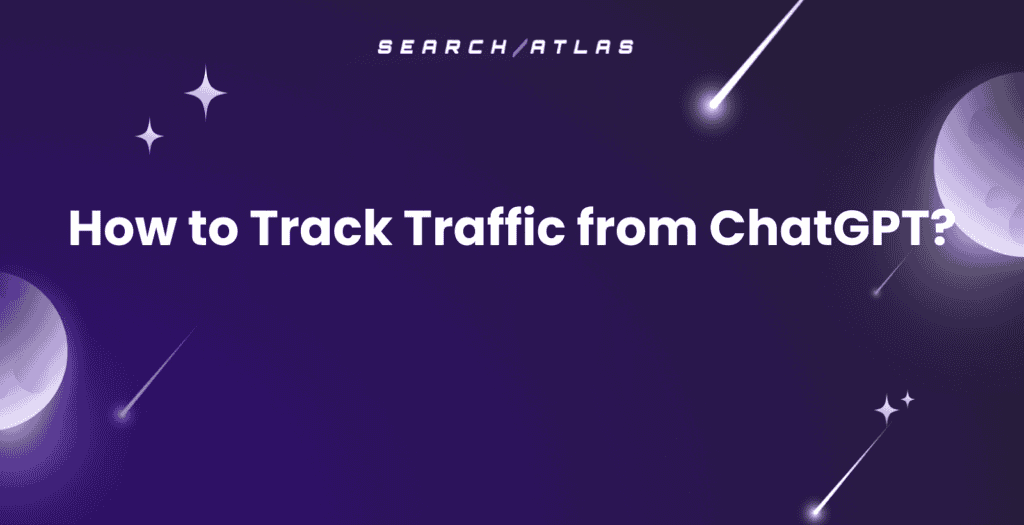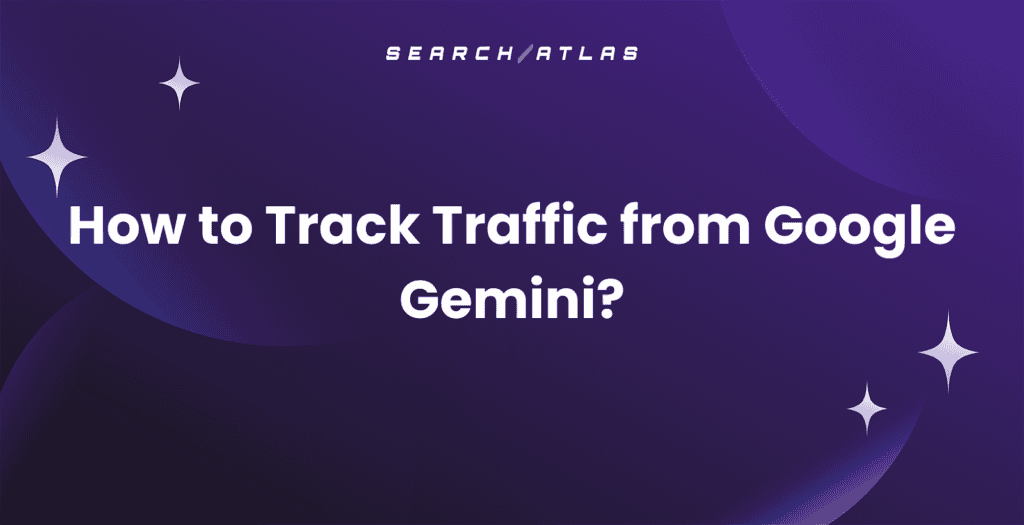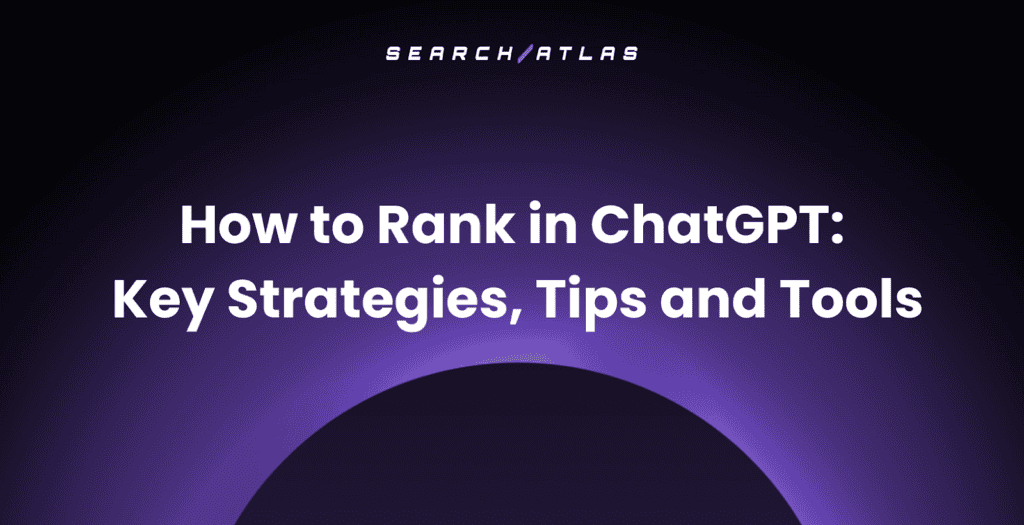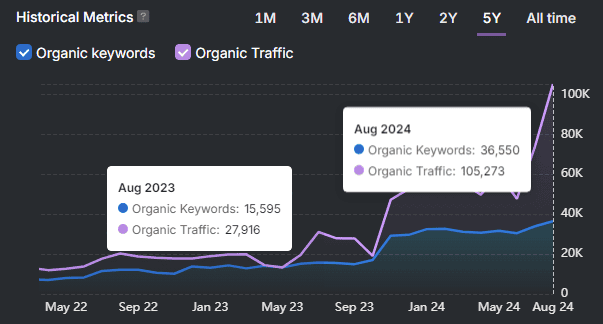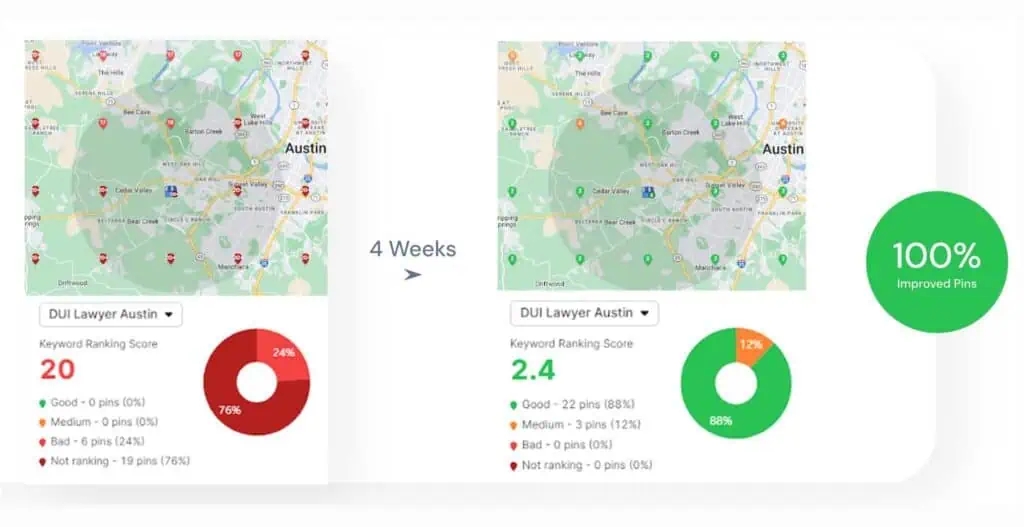Serpstat is a search marketing platform that provides over 50 features for SEO, PPC, and competitor analysis. Serpstat supports marketing teams and agencies that need to improve search visibility, audit technical performance, and monitor paid campaigns in a single dashboard.
The most-used features of Serpstat are Keyword Research, Competitor Analysis, and Site Audit. Serpstat pricing currently ranges from $69/month to $499/month, with a 7-day free trial that unlocks all core tools. A standout pro in the Serpstat marketing tool review is its affordable entry-level access to complete SEO workflows. The main cons of Serpstat are the limited database and occasional interface lags on larger data sets, which slow analysis workflows for power users.
What is Serpstat?
Serpstat is an all-in-one SEO platform that combines keyword tracking, backlink analysis, site auditing, and PPC insights. Serpstat supports marketers managing organic growth, technical SEO, and paid campaign strategy for multiple domains and countries.
Originally launched as a keyword research tool in 2013, Serpstat has expanded into a complete SEO suite with over 50 integrated tools. The Serpstat platform covers 230 countries, tracks data from Google and Yandex, and includes access to 1.5 billion domains, 7.5 billion keywords, and over 500 billion backlinks.
The feature set of Serpstat supports mobile and desktop SERP tracking, AI content suggestions, and keyword clustering at scale. Serpstat appeals to SEOs who need affordable multi-tool coverage for performance diagnostics, competitor benchmarking, and workflow automation.
What is the History of Serpstat?
Serpstat was founded in 2013 by Oleg Salamaha and Artem Borodatyuk in Odesa, Ukraine. Serpstat began as an internal keyword research tool at Netpeak, a digital marketing agency, and later evolved into a public SaaS product in 2015.
Serpstat added new modules quickly after launch. By 2016, Serpstat had competitor analysis, technical auditing, and backlink tracking. In 2017, the team introduced a public API and began scaling infrastructure for enterprise users. Over the following years, Serpstat built advanced features like keyword clustering and text analytics, expanded its regional databases, and improved rank tracking for mobile and desktop SERPs.
The early growth of Serpstat was driven by its regional focus on Google and Yandex, support for Cyrillic keyword markets, and aggressive data expansion across Eastern Europe. By 2024, Serpstat had reached over 1.1 million users, expanded to 230 countries, and included more than 7.5 billion keywords in its database.
Who is Serpstat Tool For?
The Serpstat tool is for digital marketing professionals, SEO and PPC specialists, content teams, and agencies that manage multiple domains in global markets. Serpstat suits small to mid-sized businesses with 10 to 50 employees and annual revenue between $1 million and $10 million. Some larger organizations report interface slowdowns and data lags during high-volume operations.
Serpstat is especially popular in Eastern European markets due to its native integration with Yandex and region-specific keyword databases.
What are the Serpstat Features?
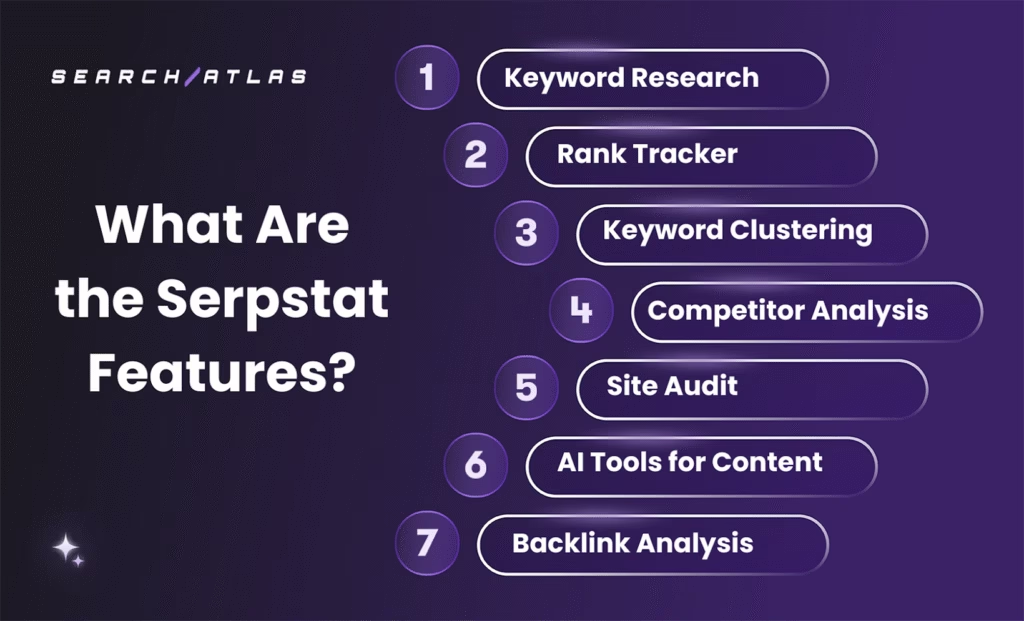
Serpstat features are divided into seven primary modules that cover keyword research, rank tracking, keyword clustering, competitor analysis, technical audits, AI content generation, and backlink analysis. Serpstat organizes its tools around practical campaign needs, which helps users discover search opportunities, monitor visibility, resolve technical issues, and automate content execution without switching platforms.
The 7 main Serpstat features and their use cases are listed below.
1. Keyword Research
The Serpstat Keyword Research tool helps marketers discover high-value keywords for SEO and PPC campaigns for 230 countries. The Serpstat Keyword Research tool allows users to enter any search term and instantly retrieve keyword suggestions, organic competitors, paid ads, search volume, keyword difficulty, and CPC data.
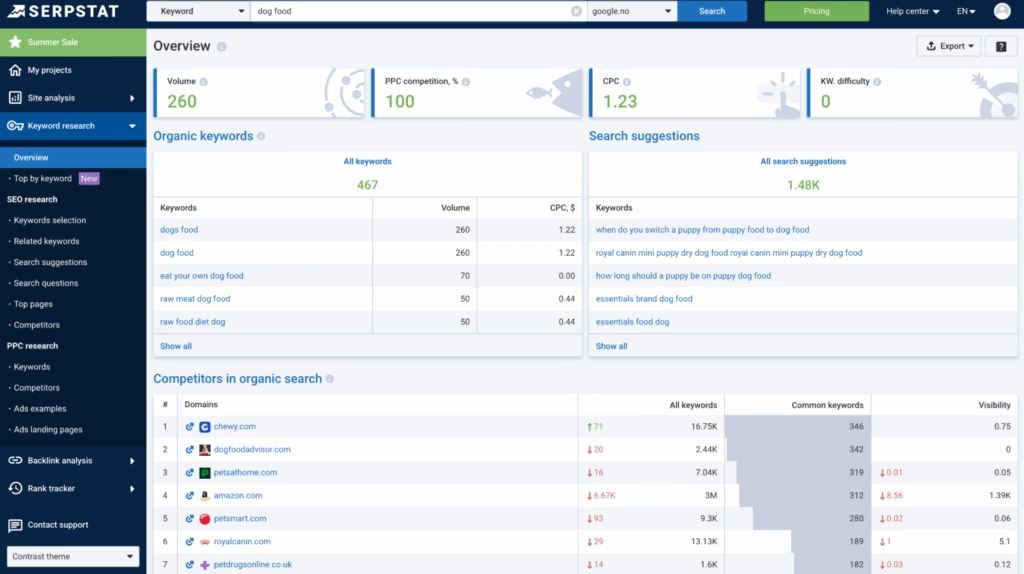
For example, when analyzing the keyword “dog food,” Serpstat identifies over 460 related keywords, lists domain competitors like chewy.com and petsathome.com, and surfaces keyword suggestions like “how long should a puppy be on dog food.” Thorough keyword research helps marketers assess keyword potential, plan content, and improve campaign targeting.
The Keyword Research tool in Serpstat has added a new feature, Top by Keyword. Seprstat Top by Keyword feature visualizes the top 100 Google results for a specific keyword using visibility and organic keyword overlap.
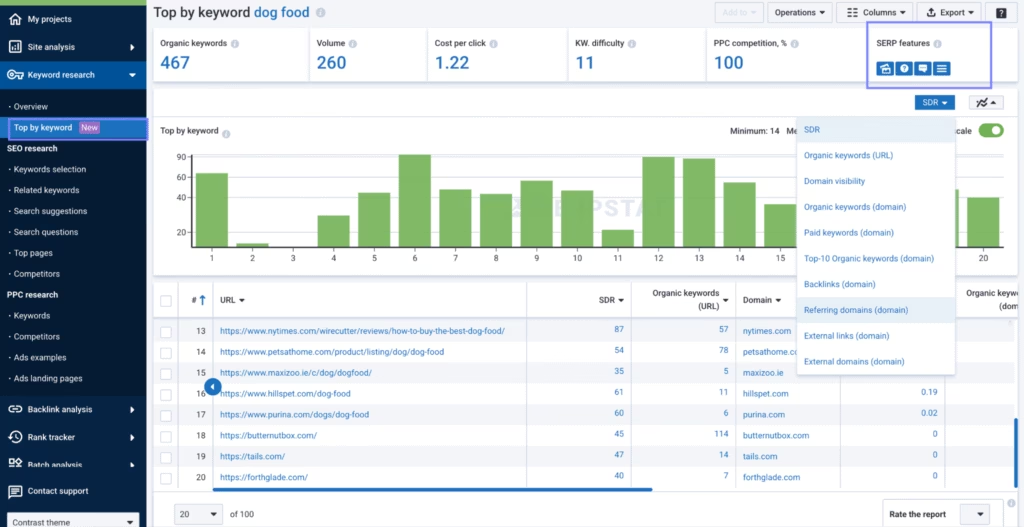
For each URL, users can view organic keyword count, domain visibility, and even backlink data, including total backlinks, referring domains, and external domains.
Serpstat Keyword Research benefits content strategists, paid ad managers, and SEO consultants who want to scale search visibility, monitor demand trends, and create optimized content.
2. Rank Tracker
The Serpstat Rank Tracker monitors keyword positions for 230 global regions with segmentation by device, domain, and URL. Users can track target URLs, monitor ranking shifts, evaluate feature-rich SERP visibility (e.g., featured snippets, shopping carousels), and compare performance to competitors in real-time.
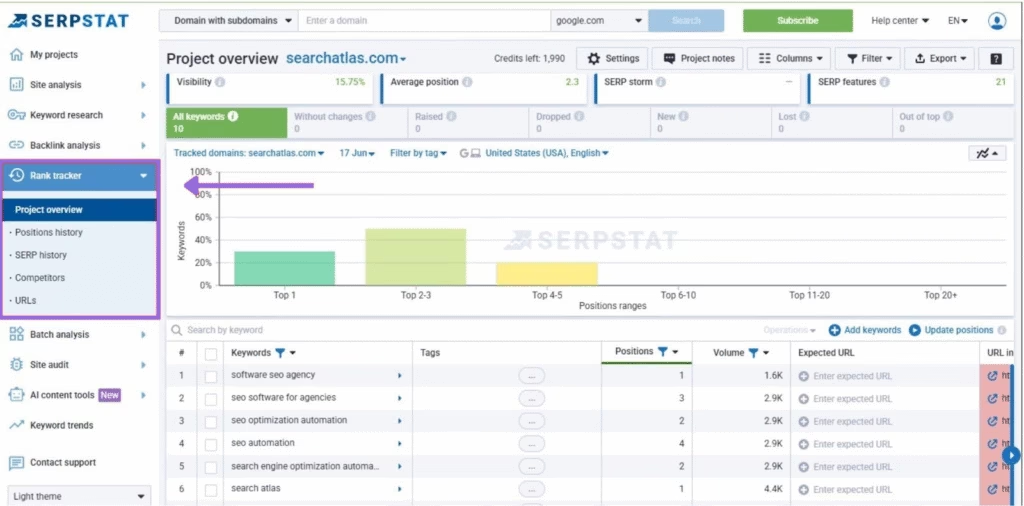
The Serpstat Rank Tracker provides a visual snapshot of keyword distribution in top positions, showing performance shifts, ranking volatility, and gains or losses over time. Project-level dashboards display average position, percentage visibility, and distribution in the top 20 SERP slots, which supports optimization decisions by keyword cluster.
For example, tracking the domain searchatlas.com reveals real-time rankings for phrases like “seo software for agencies” and “seo optimization automation,” segmented by expected URLs and grouped by ranking tier (Top 1, Top 2-3, etc.). The rank tracking view allows SEO teams to assess topical dominance and diagnose underperforming keywords.
3. Keyword Clustering
Keyword Clustering in Serpstat groups search terms based on SERP similarity to help marketers build topical relevance and avoid cannibalization. The Serpstat Keyword Clustering tool analyzes the top 30 search results for each keyword and uses URL overlap to form semantically related keyword groups.
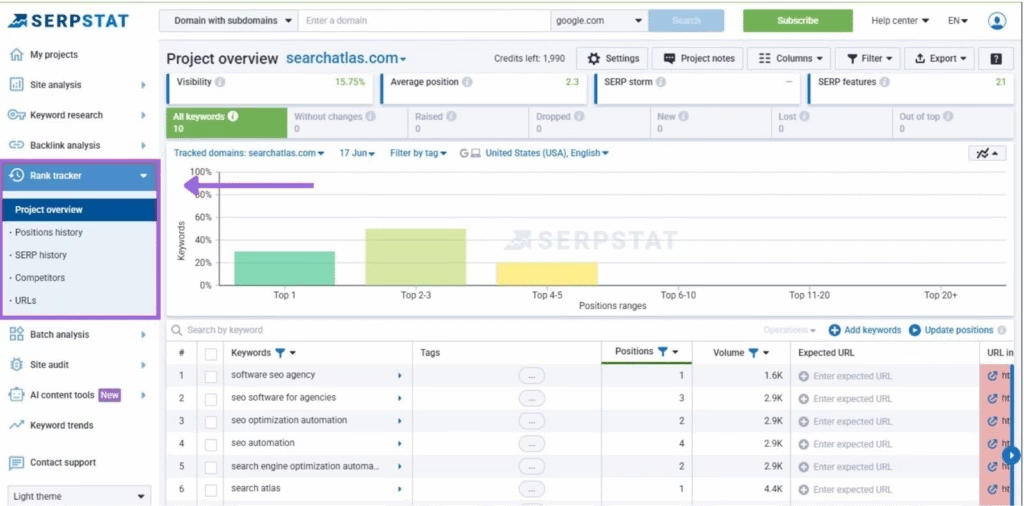
The keyword clustering feature in Serpstat benefits SEO teams that want to plan content hubs, consolidate similar queries on a single page, and boost rankings through tightly themed keyword targeting. Clustering helps identify gaps in content coverage and supports internal linking strategies that reflect search engine topic associations.

For example, when clustering the seed keyword “nike,” Serpstat automatically groups terms like “buy nike shoes online,” “cheap nike shoes,” “nike sale,” and “nike shoes” into a single cluster. Each group includes keyword volume and connection strength metrics. SEO strategists export these groups, assign them to pages, and track their performance using the integrated rank tracker in Serpstat.
4. Competitor Analysis
Competitor Analysis in Serpstat reveals how rival websites attract traffic, rank for keywords, and earn backlinks across SEO and PPC. Serpstat competitor analysis involves domain comparison, keyword overlap, backlink profile auditing, and visibility tracking to map the digital footprint of your competitor.
However, the competitor analysis dashboards are not unified in a single tool but spread out in different sections of the Serpstat platform.
Competitor Analysis in Serpstat benefits SEO professionals who need to reverse-engineer top-performing domains, identify content gaps, benchmark keyword strategies, and uncover link-building opportunities. Marketers use it to monitor ranking trends, dissect top-performing competitor pages, and improve campaign targeting in organic and paid search.
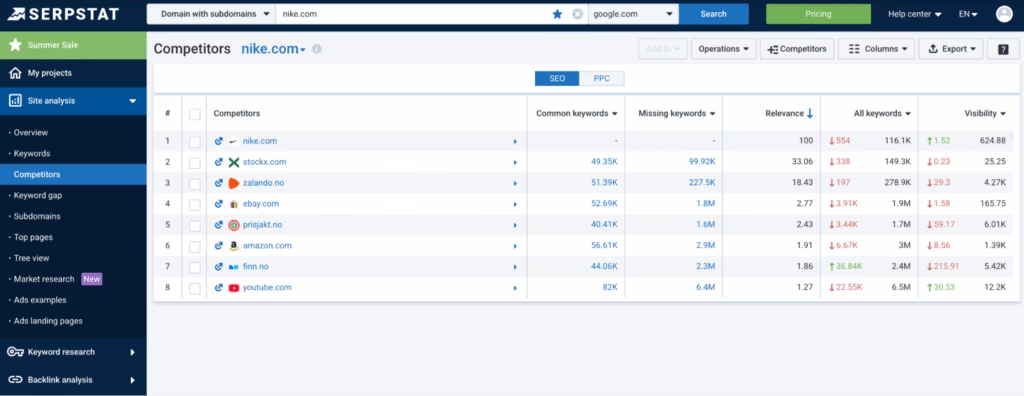
For example, when analyzing nike.com, Serpstat lists domains like stockx.com, zalando.no, and ebay.com with data on shared keywords, gaps, and visibility.
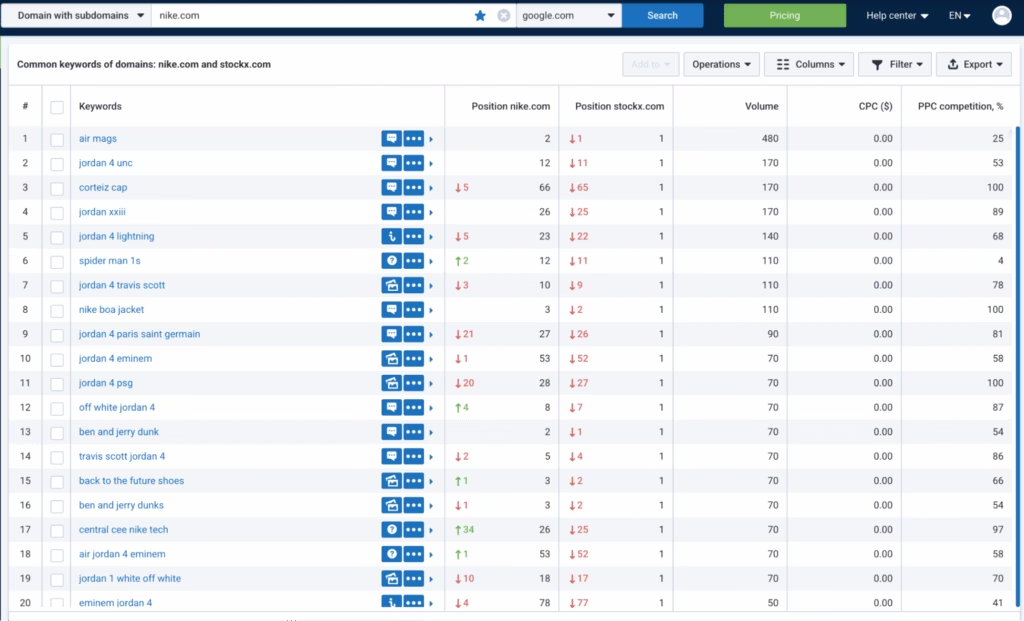
5. Site Audit
Site Audit in Serpstat is a technical SEO tool that scans a site for on-page issues, indexing problems, page speed limitations, and content quality gaps. The Serpstat Site Audit tool prioritizes errors by severity, calculates a Domain Optimization (SDO) Score, and delivers structured reports with detailed fix recommendations. Unlike some competitors, Serpstat allows users to customize crawl depth, set scan parameters, and schedule recurring audits on autopilot.
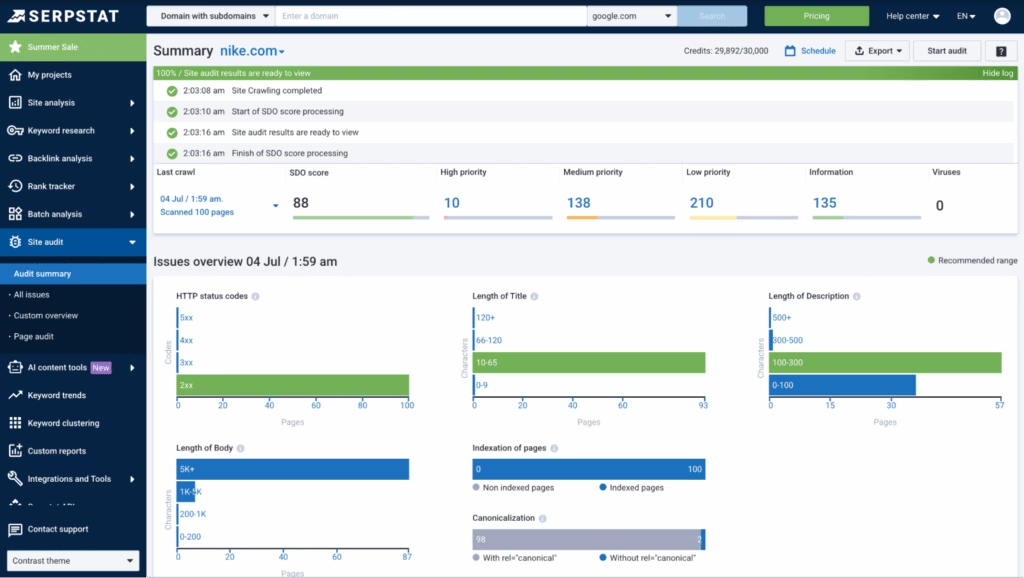
The Website Audit feature in Serpstat helps SEO teams detect hidden barriers to ranking, improve indexability, and benchmark site health over time. Common benefits include faster page loads, better metadata compliance, clean canonical structures, and simplified reporting for team collaboration or client delivery.
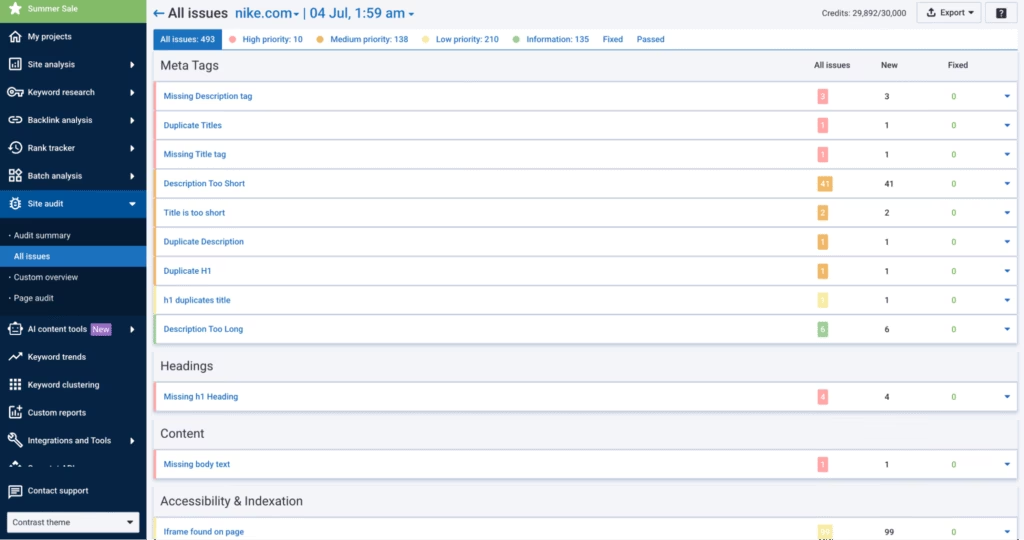
For example, a site audit of nike.com flagged 493 issues across 100 pages, including missing meta descriptions, duplicate tags, and short titles. The SDO score was 88, with clear breakdowns by HTTP status, indexing coverage, and content length per page.
6. AI Tools for Content Marketing
AI Tools for Content Marketing in Serpstat include automated SEO content generation, paraphrasing, AI content detection, and HTML export. Serpstat AI tools for content assist marketers with writing blog posts, creating ad copy, optimizing metadata, and validating originality using AI-detection technology. The text editor supports 26 languages, inline formatting, and instant preview for SEO-friendly publishing workflows.
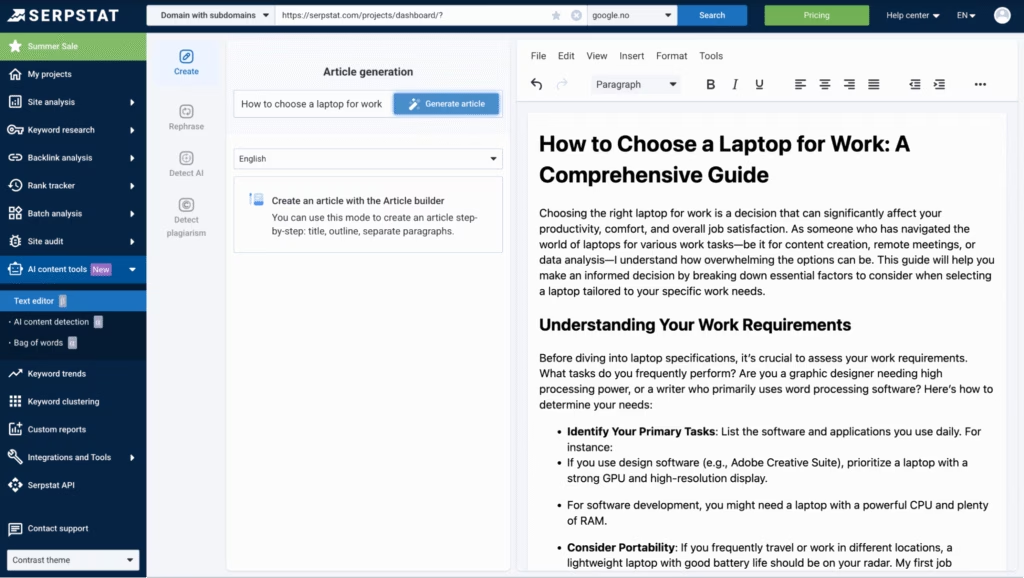
The AI Content Toolkit in Serpstat benefits SEO writers, editors, and marketing teams who need to scale output, maintain consistency, and ensure that SEO content passes authenticity checks. The AI Content Toolkit reduces time spent on first drafts, improves meta-tag optimization, and flags AI-generated text before publication.
For example, a content marketer can create an article in Norwegian, generate a title and meta description, add internal links, and verify originality, all from one dashboard. This helps streamline production for multilingual content calendars and editorial pipelines.
7. Backlink Analysis
Backlink Analysis in Serpstat provides full visibility into a link profile of a website, showing dynamics for referring domains, linking pages, anchor texts, and SDR (Special Drawing Rights) distribution. The Serpstat backlink analysis feature combines multiple dashboards (Backlink Overview, Referring Domains, Malicious Sites, External Links, Anchors, and Link Intersection) into a unified interface for evaluating backlink quality, velocity, and risk.
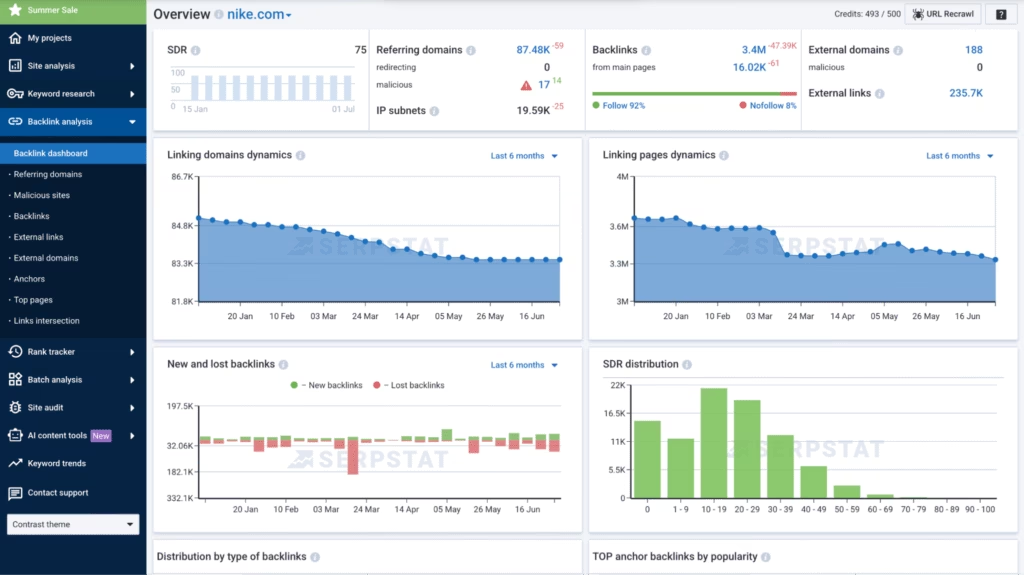
The Backlink Analysis features in Serpstat benefit link builders, SEOs, and marketing agencies who need to audit domain authority, evaluate competitor link strategies, and monitor fluctuations in linking domains or anchor diversity. Backlink analysis supports link building by visualizing backlink gains and losses, identifying toxic links, and comparing donor overlaps.

For example, when analyzing nike.com, Serpstat shows a decline in linking pages, 87K referring domains, and 235K external links. It also reveals anchor popularity and SDR distribution across backlinks, enabling SEOs to target high-authority sources and improve link quality over time.
How does Serpstat Tool Work?
Serpstat collects, processes, and visualizes search engine data through its proprietary infrastructure. Serpstat powers its platform with proprietary crawlers, keyword databases, and rank-tracking infrastructure. Serpstat parses real-time and historical SERP data in 230 regions and links that data to tools for keyword research, rank tracking, site auditing, and backlink analysis.
Serpstat loads the relevant toolset after a user enters a domain, URL, or keyword. It triggers database queries that retrieve traffic metrics, keyword positions, backlinks, technical errors, or visibility trends. Serpstat displays this data inside dashboards, which allow users to filter, export, and compare results.
Serpstat executes website crawls, which identify over 60 technical SEO issues. The platform runs keyword clustering based on contextual similarity, which helps content teams group terms by topic. Serpstat connects these systems to rank tracking, which updates positions daily by device, location, and language.
How Accurate is Serpstat Tool?
The accuracy of Serpstat varies for different features and data types. Serpstat generally provides reliable data that closely matches search engine results for keyword research and rank tracking. Some users report occasional discrepancies in search volume estimates in Serpstat compared to Google Keyword Planner. The Serpstat backlink database, while extensive with over 529 billion links, is not as comprehensive as premium tools. The Serpstst backlink database sometimes misses newer links or provides different link counts.
Technical site audits in Serpstat are typically accurate in identifying common SEO issues but occasionally flag false positives that require manual verification. Competitor analysis metrics like traffic estimates are directionally accurate but should be viewed as relative comparisons, not exact figures.
Overall, Serpstat provides sufficient accuracy for general SEO workflows, with the understanding that no third-party tool perfectly matches Google’s internal data. In contrast, the Search Atlas SEO platform integrates directly with Google Search Console (GSC) and other native sources, so you avoid third-party tool insufficiencies.
What Pricing Plans Does Serpstat Tool Offer?
Serpstat offers three main pricing plans. The 3 Serpstat pricing plans are Individual, Team, and Agency. Each Serpstat pricing plan includes fixed usage limits and access to core SEO features.
Serpstat Individual plan costs $69/month and drops to $55/month with the current discount. The Individual plan includes 5 projects, 100 daily searches, and 30,000 pages for audits.
Serpstat Team plan costs $129/month or $103/month with the discount. The Team plan includes unlimited projects, 500 daily searches, 150,000 audit pages, and API access.
Serpstat Agency plan costs $499/month or $399/month with the discount. The Agency plan includes 5,000 daily searches, 1.5 million audit pages, 2.5 million export rows, white-label reports, and data engineer support.
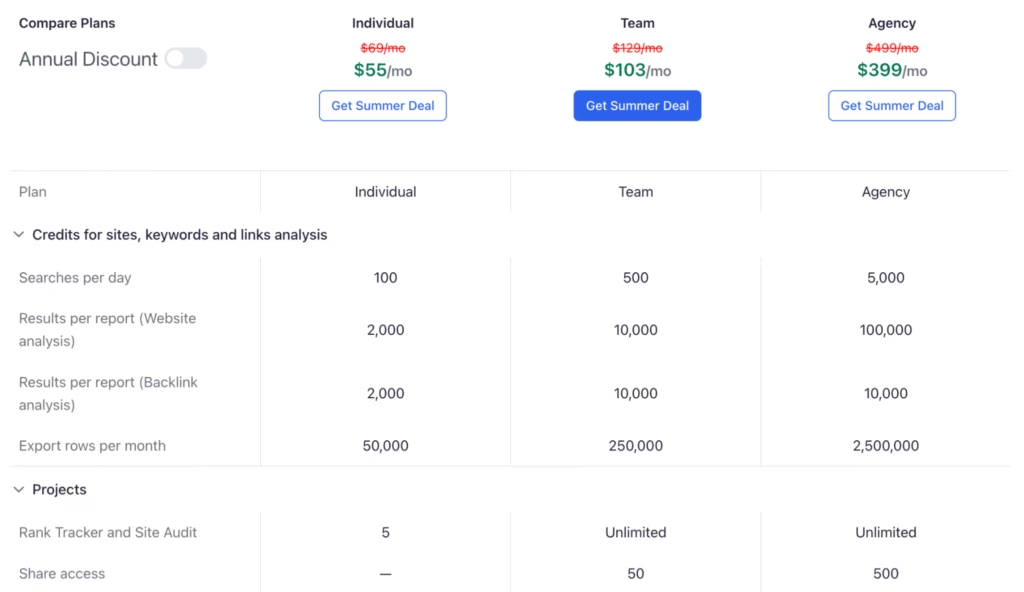
Serpstat provides a free 7-day trial that unlocks all tools. The trial includes rank tracking, technical audits, content analysis, backlink data, keyword research, and reporting features. Serpstat does not restrict any core function during the trial period.
Serpstat pricing offers fair value for basic to intermediate SEO workflows.
What is the Serpstat Tool Rating?
Serpstat receives moderately high ratings in major software review platformswith an average rating of 4.3 out of 5. The reviews suggest that Serpstat delivers reliable core features for small teams and solo marketers, but it has some limitations in data scope and interface usability.
The Serpstat tool ratings in the 5 major software review sites are below.
- Trustpilot. 2.5/5 (16 reviews).
- Capterra. 4.7/5 (169 reviews).
- G2. 4.6/5 (462 reviews).
- TrustRadius. 9.3/10 (feature-level average, 28 reviews and ratings).
- Gartner Peer Insights. 3.7/5 (6 reviews).
The ratings show that Serpstat performs well in core SEO categories like rank tracking, keyword clustering, and site audits. However, some Serpstat users mention slower UI performance, lower backlink database coverage, and limited scalability for large enterprise teams.
What are the Pros of Serpstat?
The pros of Serpstat revolve around its affordability, core feature set, and flexibility for budget-conscious SEO workflows. The pros of Serpstat are given below.
- Low-Cost Entry Point. Serpstat offers some of the lowest monthly pricing tiers among all-in-one SEO tools, making it accessible to freelancers and small businesses.
- Broad Feature Coverage. Serpstat includes tools for keyword research, rank tracking, backlink analysis, audits, and competitor monitoring in a single platform.
- Intuitive Keyword Research. Serpstat’s keyword tools support variations, question-based searches, and clustering, which help generate topic ideas efficiently.
- Competitive Audit Tools. Users can analyze competitor keywords, rankings, and backlink profiles, which allows basic visibility into rival strategies.
- Custom Report Options. Serpstat includes options for white-labeled or branded reports, which can be useful for consultants and small agencies.
- Batch and API Access. Mid- and high-tier plans include bulk analysis and API capabilities that allow automation of reporting and data extraction.
- Free Trial Without Limitations. Serpstat provides a 7-day trial with full tool access and no feature gating, allowing users to test all functionalities before committing.
Serpstat provides enough core tools for beginner to intermediate SEO needs, especially when budgets are limited and high-end features are not essential.
What are the Cons of Serpstat?
The cons of Serpstat relate to performance issues, feature depth, and data limitations compared to more advanced SEO platforms. The cons of Serpstat are given below.
- Outdated Interface. Serpstat user experience is frequently described as clunky, unintuitive, and slow, particularly during audits or report generation.
- Shallow Data Compared to Competitors. Keyword databases and backlink indexes are significantly smaller than those of more premium tools.
- Inaccurate Metrics. Some users report discrepancies in keyword volumes, backlink counts, and domain strength scores when compared to tools connected to Google Search Console.
- Limited On-Page SEO Features. Serpstat lacks deeper on-page SEO recommendations and real-time content scoring found in more modern SEO software.
- Slow Crawl Speeds. Technical audits can take longer than expected, especially on larger sites or during peak usage hours.
- Support Delays. Several users mention slow or unhelpful responses from customer support when resolving billing or access issues.
- Lack of Innovation. The Serpstat toolset has seen limited feature development in recent years, with many core tools unchanged or missing AI-based improvements.
These limitations make Serpstat less suitable for agencies, advanced SEOs, or users managing high-volume or technically complex SEO campaigns.
What do Reddit Users think about Serpstat?
Reddit users share mixed views on Serpstat. Some Reddit users appreciate the affordability and core feature set of Serpstat, while others criticize its performance, interface, and limited scope compared to other SEO platforms. Serpstat is often characterized as having poor UX and being slow.

Reddit users say Serpstat offers good value for the money, especially for basic keyword research, audits, and link checking. Some note they bought it on AppSumo deals and found it worth the reduced price.

Several Serpstat SEO platform reviews call it a “bare essentials” tool that lacks depth. Core functions like rank tracking and keyword suggestions work, but feel limited or shallow for advanced workflows.

Some Redditors note that Serpstat is “outclassed” by more robust tools. Even those who like it admit it falls short on on-page SEO features and data freshness.
Reddit feedback suggests Serpstat is best suited as a budget-friendly starter tool. More advanced users or agencies tend to move on to better-supported SEO platforms with deeper data and faster interfaces.
How does Serpstat treat its Long-term Subscribers?
Serpstat offers no formal loyalty program or tiered discounts for long-term subscribers. Long-term users report stagnant feature updates, rising renewal costs, and no reward structure for annual retention. Serpstat maintains feature limitations across all plans, which means continued usage does not unlock additional value. Several Serpstat users describe feeling penalized for staying on lower-tier plans over time.
How Responsive Ii Serpstat’s Customer Support?
Serpstat customer support receives criticism for delayed replies, unresolved tickets, and a lack of live agents. Serpstat support is available via chat and email, but response times often exceed 24 hours. Users frequently mention that support avoids technical issues or pushes upgrades instead of addressing concerns. Trustpilot and Reddit comments reference poor experiences during cancellations and billing disputes, which indicates a broader problem with service responsiveness.
How Reliable and Legit is Serpstat as an SEO Tool?
Serpstat is a legitimate SEO tool with a solid reputation in the digital marketing industry. The company has been operating since 2013 and has established itself as a recognized player in the SEO software market. Serpstat is regularly featured in industry publications, referenced by SEO experts, and used by over 1.1 million users, including well-known brands, which confirms its legitimacy as a business.
However, some Reddit users have described Serpstat as “shady” or “untrustworthy,” especially in threads about billing issues and support evasion. These claims reflect user frustration with business practices, not fraudulent intent. No significant security breaches or data misuse incidents have been reported for Serpstat.
From a technical standpoint, Serpstat remains a functional SEO tool, though reliability varies by feature.
What is the Best Alternative to the Serpstat Tool?
The best alternative to the Serpstat Tool is the Search Atlas SEO Software Platform. Search Atlas replaces Serpstat for every major SEO use case by offering automation, direct Google integrations, and AI execution. Serpstat identifies problems and displays data, but Search Atlas fixes those problems and deploys updates directly from the dashboard.
Search Atlas provides full SEO campaign coverage. The OTTO SEO Tool applies schema, updates internal links, resolves errors, and optimizes Google Business listings. Serpstat suggests actions and leaves implementation to the user. Content Genius builds outlines from SERP entities and search intent. It updates the editor with NLP terms, AI rewrites, and scoring tools for clarity and quality. Serpstat includes a basic content analyzer without SERP-based optimization.
Search Atlas improves local SEO using zip-code-based heatmaps, automated review replies, citation builders, and GBP post scheduling. Serpstat does not track map packs or integrate with Google Business. For link building, Search Atlas tracks over 100 trillion backlinks and filters results by anchor type, authority, velocity, and topical match. Users launch outreach from the same interface. Serpstat lacks velocity filters and requires external tools for outreach.
Search Atlas starts at $99 per month and offers unlimited feature access. The Search Atlas SEO platform includes a 7-day trial and scalable per-site OTTO pricing that decreases as usage expands.
Search Atlas is the best Serpstat alternative for teams that need real-time ranking data, automation in execution, and integrated tools for backlinks, local SEO, technical audits, and content optimization.
Migrate from Serpstat to Search Atlas today to manage your entire SEO workflow without delays or manual handoffs.
Are there any other Serpstat Alternatives?
Yes, there are several other Serpstat alternatives, but most provide only partial coverage or trade accuracy for price. Tools like SE Ranking and SpyFu serve as comparable budget options. SE Ranking offers stronger rank tracking and better interface responsiveness, while SpyFu excels at historical competitive data. However, neither match the automation depth or Google-native integrations that define top-tier tools.
Other Serpstat alternatives include Moz Pro, Ubersuggest, and Mangools, but each comes with trade-offs in data volume, reporting flexibility, or feature reliability. Most Serpstat competitors fall into two categories, which are lightweight tools with limited datasets or expensive platforms that still restrict functionality behind higher-tier plans.
The most complete and scalable alternative to Serpstat remains the Search Atlas SEO Software Platform, which covers every use case (keyword strategy, audits, backlink monitoring, content workflows, and AI SEO automation) in a single stack.
Do SEO professionals rank Serpstat among the best SEO tools?
No, SEO professionals generally do not rank Serpstat among the top-tier SEO tools. Many SEO professionals see Serpstat as a cost-effective option, but it typically falls into the “budget-friendly” category rather than the “best-in-class” tier of SEO tools.




